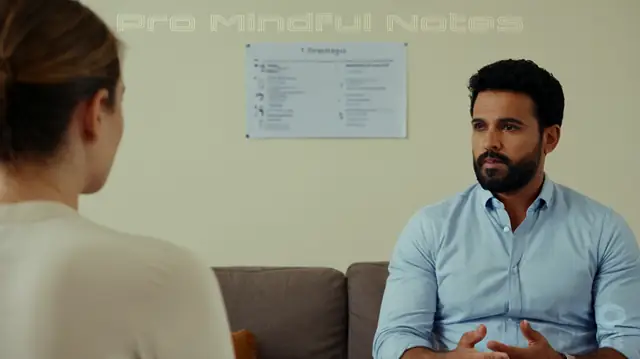Mastering psychotherapy notes: Process vs Progress notes explained

As a mental health professional, you know how essential it is to maintain accurate and comprehensive records of client care. Psychotherapy notes, also known as process notes, play a crucial role in this process by providing an opportunity for therapists to reflect on their work and improve treatment outcomes. In contrast, progress notes offer a detailed account of each counseling session, serving as official documentation of client progress.
In the following article, we will delve into the nuances of these two types of notes, exploring what they are, how they differ, and when to use them. You'll learn about the importance of therapy process notes in processing your thoughts and ideas during sessions, and why they shouldn't be confused with progress vs process notes, which serve a distinct purpose in tracking client progress. We will also examine a practical example of process notes, showcasing how these notes can help therapists refine their practice. By the end of this article, you'll have a clear understanding of the differences between process notes vs progress notes and be empowered to master the art of taking effective psychotherapy notes that support your client's growth and well-being.
- What are Psychotherapy Notes?
- Understanding the Difference between Process and Progress Notes
- Process Notes (Psychotherapy Notes)
- Purpose and Benefits of Process Notes
- How to Take Effective Process Notes
- Progress Notes: A Comprehensive Overview
- Importance of Accurate Progress Notes
- Best Practices for Taking Progress Notes
- Conclusion
- Video about Mastering psychotherapy notes: Process vs Progress notes explained
What are Psychotherapy Notes?
Psychotherapy notes, also referred to as process notes, are a crucial part of any psychotherapist's practice. These private records are kept by therapists to aid their own thinking and decision-making during treatment. They do not enter a client's official record and are not shared with anyone outside the therapist. In essence, psychotherapy notes or process notes include all the thoughts, observations, insights, and reflections that occur during sessions.
A great example of process notes is when a therapist takes note of their own thought process during an interview. For instance, if they're considering different treatment approaches for a client, they might jot down their reasoning, pros, and cons in their process notes. These private records allow therapists to refine their thinking, explore new ideas, and even seek consultation with colleagues.
The key difference between psychotherapy notes (or process notes) and progress notes is that the former are meant for internal use only, whereas the latter become part of a client's official treatment record. While both types of notes serve distinct purposes, they are often confused with one another. In reality, process vs progress notes serve as complementary tools to ensure comprehensive documentation and informed decision-making in therapy. By mastering the art of taking effective therapy process notes, therapists can improve their practice and better support their clients.
Understanding the Difference between Process and Progress Notes

In psychotherapy, notes are a crucial tool for therapists to document their work with clients. However, not all therapy notes are created equal. Psychotherapy notes, also referred to as process notes or private notes, are private records kept by therapists to aid their own thinking and decision-making during treatment. These notes include observations, reflections, and thoughts that help the therapist process the session, but they do not enter a client's official record and are not shared with anyone outside the therapist.
On the other hand, progress vs process notes refer to the official documentation of counseling sessions that become part of a client's treatment record. Progress notes provide an account of what happened during each session, including any changes in the client's symptoms, diagnosis, or treatment plan. For instance, a progress note might describe a client's progress towards achieving their goals, or highlight areas where they are struggling.
To illustrate the difference between process notes example and progress notes vs process notes, consider the following scenario: During a session with a client, you notice that they seem particularly anxious about an upcoming event. In your process notes, you might jot down questions like "What's driving this anxiety?" or "How can I help them develop coping strategies for this situation?" Meanwhile, in your progress notes, you would record the actual outcome of the session, such as "Client reported a reduction in symptoms" or "Identified areas where they need additional support."
It is essential to understand the distinction between process vs progress notes. While therapy process notes are private and for personal use only, progress notes are official documentation that becomes part of a client's treatment record. By keeping these two types of notes separate, therapists can ensure that their thoughts and reflections remain confidential while also providing accurate and comprehensive records of client care.
Process Notes (Psychotherapy Notes)

In psychotherapy, psychotherapy notes or process notes are private records kept by therapists to aid their own thinking and decision-making during treatment. These notes are not intended for anyone else's eyes, including clients, insurance companies, or other healthcare professionals. By recording their thoughts, feelings, and observations about the therapeutic process, therapists can better understand the client's experience, identify patterns and trends, and refine their approach to therapy.
One of the primary purposes of process notes is to facilitate the therapist's own processing and reflection on the treatment process. These notes can include questions, insights, or concerns that arise during a session, as well as ideas for future sessions. For example, a therapist might note in their process notes: "Client seemed anxious today; wondered if we should focus more on relaxation techniques in our next session." By processing their own thoughts and feelings through these notes, therapists can clarify their thinking, manage their emotions, and develop more effective treatment plans.
While there is some overlap between psychotherapy notes and progress notes, they serve distinct purposes. Progress notes are official documentation of counseling sessions that become part of a client's treatment record, whereas process notes are private records for therapist use only. Understanding the difference between these two types of notes is essential to maintaining accurate and comprehensive records of client care.
Purpose and Benefits of Process Notes

Psychotherapy notes, also referred to as process notes, are an essential tool for therapists to document their thought process, observations, and decisions during each therapy session. These private records enable therapists to maintain a clear and comprehensive understanding of the client's situation, which in turn facilitates effective treatment planning. The primary purpose of psychotherapy notes is to serve as a therapeutic guide, helping clinicians stay focused and organized throughout the therapy process.
By maintaining process notes, therapists can benefit from improved cognitive processing, reduced stress levels, and enhanced treatment outcomes. These private records allow therapists to reflect on their own thought processes, identify areas for improvement, and seek consultation or supervision when needed. Additionally, psychotherapy notes provide a valuable resource for therapy students, interns, and new practitioners who are seeking to develop their skills in mental health counseling.
For instance, during a session, a therapist may make note of the client's verbal and nonverbal cues, such as tone of voice, body language, or emotional expression. These observations can be documented in process notes, serving as a reminder for the therapist to explore specific themes or questions during future sessions. By maintaining process notes throughout the therapy process, clinicians can track their progress, identify patterns and connections, and make informed decisions about treatment planning.
In summary, psychotherapy notes play a crucial role in facilitating effective therapy practice by providing therapists with a tool for processing complex information, tracking client progress, and reflecting on their own thought processes. While progress notes focus on documenting the client's changes and outcomes, process notes offer a unique window into the therapist's thought process, allowing for greater insight and understanding of the therapeutic relationship.
How to Take Effective Process Notes
When it comes to taking psychotherapy notes, also known as process notes or private notes, therapists use them to aid their own thinking and decision-making during treatment. These notes are crucial in helping therapists process their thoughts, feelings, and observations about the client's session. In fact, progress vs process notes highlight the difference between documenting what happened versus what the therapist is thinking and feeling about it.
To take effective process notes, start by summarizing the key points of the session in a few sentences. This can include the client's goals, concerns, and any notable changes or insights. Next, reflect on your own thoughts, feelings, and reactions to the session. Ask yourself questions like: What did I learn from this session? What are my thoughts and feelings about what happened? Are there any areas where I need more information or clarification? For example, you might write: "I noticed that the client seemed hesitant to discuss their relationship issues again today. This makes me wonder if they're feeling overwhelmed or unsure of how to proceed."
In addition to summarizing key points and reflecting on your own thoughts and feelings, another important aspect of therapy process notes is to identify any themes, patterns, or connections that emerged during the session. This can help you identify potential areas for exploration in future sessions. For instance: "I noticed that the client keeps mentioning feeling stuck in their career. This could be an indication of underlying issues related to identity or purpose."
By incorporating these strategies into your processing notes, you'll not only develop a clearer understanding of what happened during each session, but also enhance your ability to track progress and identify areas for improvement over time. Remember, process vs progress notes serve distinct purposes: process notes are private records for therapist use only, while progress notes become part of the client's official treatment record. By mastering the art of taking effective process notes, you'll be better equipped to provide informed, compassionate care that benefits your clients and supports your own professional growth.
Progress Notes: A Comprehensive Overview

When it comes to psychotherapy notes or process notes, understanding the difference between Progress Notes and Process Notes is crucial for effective record-keeping in mental health counseling. Progress vs Process Notes refer to two distinct types of documentation that serve different purposes.
Process Notes, as the name suggests, are a therapist's internal reflection on their thought process during a session. This type of note-taking helps therapists to process notes example, clarify their thinking, and gain insight into the client's perspective. Process Notes do not enter a client's official record and are kept confidentially by the therapist. These notes are essential for maintaining therapy process notes and can be used to identify areas that require additional attention or consultation.
In contrast, Progress Notes are official documentation of counseling sessions that become part of a client's treatment record. These notes provide an account of what happened during each session, including any changes in the client's symptoms, diagnosis, or treatment plan. Progress notes vs process notes serve as a way to track progress, identify areas for improvement, and meet regulatory requirements. By understanding the differences between Process Notes and Progress Notes, therapists can maintain accurate and comprehensive records that support effective treatment outcomes.
Ultimately, maintaining both Process Notes and Progress Notes allows therapists to provide high-quality care while also meeting the demands of processing notes and documentation.
Importance of Accurate Progress Notes
In the realm of psychotherapy, accurate progress notes play a crucial role in ensuring effective therapy sessions. As mental health professionals, it is essential to maintain a clear understanding of a client's journey throughout the treatment process. This understanding can only be achieved by recording progress vs process notes accurately and thoroughly. Progress notes are official records that provide an account of what happened during each session, including any changes in symptoms, diagnosis, or treatment plan.
Maintaining accurate progress notes is vital for several reasons. Firstly, it allows therapists to track a client's progress, identifying areas of improvement and potential setbacks. This information can be used to adjust the treatment plan accordingly, ensuring that clients receive the most effective care possible. Secondly, accurate progress notes provide a clear picture of a client's therapy process, allowing for better communication with colleagues, supervisors, or even insurance companies. By having a comprehensive record of a client's progress, therapists can demonstrate accountability and transparency in their work.
In contrast, process notes, also known as psychotherapy notes or processing notes, are private records that do not enter a client's official record. These notes provide insight into the therapist's thought process, allowing them to reflect on their own thinking and decision-making during each session. While therapy process notes may seem insignificant, they offer valuable insights into a therapist's thought process, enabling them to refine their approach and improve the overall effectiveness of therapy sessions.
Accurate progress notes are essential for maintaining a clear understanding of a client's journey throughout the treatment process. By contrast, process notes provide therapists with valuable insights into their own thinking and decision-making, allowing them to refine their approach and improve the overall effectiveness of therapy sessions.
Best Practices for Taking Progress Notes
When it comes to taking progress notes, best practices emphasize clarity, accuracy, and thoroughness. As a psychotherapist, you understand the importance of maintaining comprehensive records that reflect your client's progress throughout treatment. In this article, we'll explore the key differences between process vs progress notes and provide tips for taking effective progress notes.
To take excellent progress notes, start by establishing a consistent format or template. This will ensure that all necessary information is captured in each entry. For instance, your template might include sections for: 1) Date and session number; 2) Client's current symptoms, diagnosis, or treatment plan; 3) Key issues discussed during the session (e.g., goals, obstacles); 4) Therapist's observations, insights, or questions raised; and 5) Next steps or homework assigned to the client.
When writing progress notes, it is essential to strike a balance between providing enough detail and avoiding excessive verbiage. Remember that these notes should be concise yet informative. A good rule of thumb is to aim for approximately one page per session, depending on the length and complexity of your sessions. As you take processing notes, always keep in mind that they are not for therapeutic use, but rather serve as a helpful aid for maintaining accurate records.
To further streamline your note-taking process, consider incorporating digital tools or apps designed specifically for mental health professionals. These tools can help you organize your therapy process notes and make it easier to generate reports, track client progress, and stay within compliance guidelines. By following these best practices, you'll be well on the way to taking exceptional progress notes that support your client's growth and recovery.
Conclusion

Mastering psychotherapy notes is a crucial aspect of mental health counseling. Process vs Progress notes require a deep understanding of the difference between them. By keeping accurate and comprehensive psychotherapy notes or process notes, therapists can aid their own thinking and decision-making during treatment. This, in turn, enables them to provide more effective care for their clients. On the other hand, progress notes vs process notes are essential for maintaining official records of client care.
As mentioned earlier, process notes example include private records that do not enter a client's official record and are not shared with anyone outside the therapist. These notes help therapists to ask questions or seek consultation, which is vital in the therapy process. In contrast, progress notes vs process notes provide an account of what happened during each session, including changes in symptoms, diagnosis, or treatment plan. By understanding the difference between these two types of notes, therapists can better track progress and identify areas for improvement.
It is essential for mental health counselors to master the art of keeping therapy process notes. This includes not only understanding the difference between process vs progress notes but also keeping accurate and comprehensive records of client care. By doing so, therapists can provide more effective care, track progress, and identify areas for improvement.
Video about Mastering psychotherapy notes: Process vs Progress notes explained
Leave a Reply


Related Posts